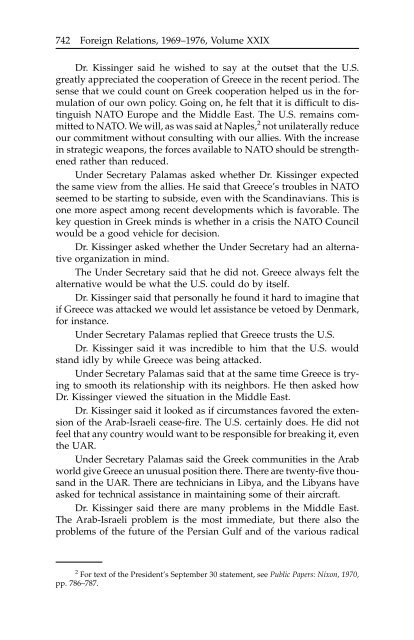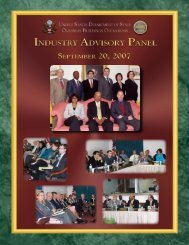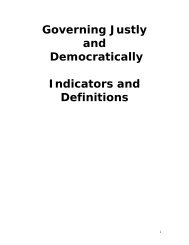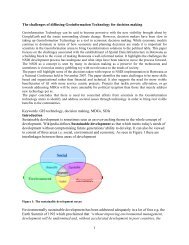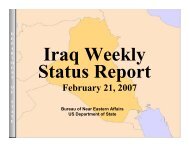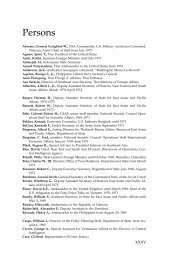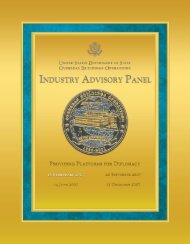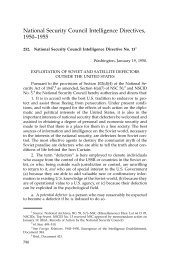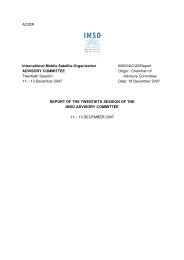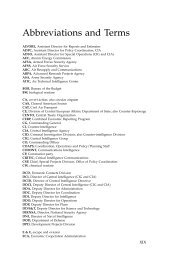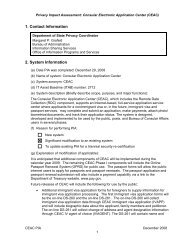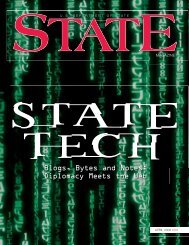Greece - US Department of State
Greece - US Department of State
Greece - US Department of State
You also want an ePaper? Increase the reach of your titles
YUMPU automatically turns print PDFs into web optimized ePapers that Google loves.
742 Foreign Relations, 1969–1976, Volume XXIX<br />
Dr. Kissinger said he wished to say at the outset that the U.S.<br />
greatly appreciated the cooperation <strong>of</strong> <strong>Greece</strong> in the recent period. The<br />
sense that we could count on Greek cooperation helped us in the formulation<br />
<strong>of</strong> our own policy. Going on, he felt that it is difficult to distinguish<br />
NATO Europe and the Middle East. The U.S. remains committed<br />
to NATO. We will, as was said at Naples, 2 not unilaterally reduce<br />
our commitment without consulting with our allies. With the increase<br />
in strategic weapons, the forces available to NATO should be strengthened<br />
rather than reduced.<br />
Under Secretary Palamas asked whether Dr. Kissinger expected<br />
the same view from the allies. He said that <strong>Greece</strong>’s troubles in NATO<br />
seemed to be starting to subside, even with the Scandinavians. This is<br />
one more aspect among recent developments which is favorable. The<br />
key question in Greek minds is whether in a crisis the NATO Council<br />
would be a good vehicle for decision.<br />
Dr. Kissinger asked whether the Under Secretary had an alternative<br />
organization in mind.<br />
The Under Secretary said that he did not. <strong>Greece</strong> always felt the<br />
alternative would be what the U.S. could do by itself.<br />
Dr. Kissinger said that personally he found it hard to imagine that<br />
if <strong>Greece</strong> was attacked we would let assistance be vetoed by Denmark,<br />
for instance.<br />
Under Secretary Palamas replied that <strong>Greece</strong> trusts the U.S.<br />
Dr. Kissinger said it was incredible to him that the U.S. would<br />
stand idly by while <strong>Greece</strong> was being attacked.<br />
Under Secretary Palamas said that at the same time <strong>Greece</strong> is trying<br />
to smooth its relationship with its neighbors. He then asked how<br />
Dr. Kissinger viewed the situation in the Middle East.<br />
Dr. Kissinger said it looked as if circumstances favored the extension<br />
<strong>of</strong> the Arab-Israeli cease-fire. The U.S. certainly does. He did not<br />
feel that any country would want to be responsible for breaking it, even<br />
the UAR.<br />
Under Secretary Palamas said the Greek communities in the Arab<br />
world give <strong>Greece</strong> an unusual position there. There are twenty-five thousand<br />
in the UAR. There are technicians in Libya, and the Libyans have<br />
asked for technical assistance in maintaining some <strong>of</strong> their aircraft.<br />
Dr. Kissinger said there are many problems in the Middle East.<br />
The Arab-Israeli problem is the most immediate, but there also the<br />
problems <strong>of</strong> the future <strong>of</strong> the Persian Gulf and <strong>of</strong> the various radical<br />
2<br />
For text <strong>of</strong> the President’s September 30 statement, see Public Papers: Nixon, 1970,<br />
pp. 786–787.


